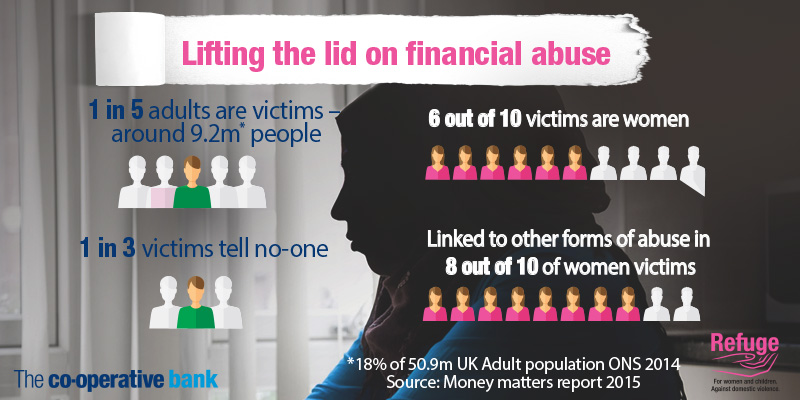10 December - a new research report has been published on financial abuse in intimate relationships, as part of a joint campaign between the Co-operative Bank and Refuge. In the largest study on this area to date, the research found that nearly one in five British adults - 9.2m people - say they have experienced financial abuse in an intimate relationship. The research was reported on in The Guardian.
The “My Money, My Life” campaign aims to raise awareness of financial abuse in intimate relationships, where financial control, exploitation or sabotage are used as a means of control.

The chair of the bank's Values and Ethics Committee, Laura Carstensen said: “While other types of domestic abuse are well-documented, the impact of this kind of coercive control where money is used as a weapon within an intimate relationship is not yet fully understood."
The chief executive of Refuge, Sandra Horley CBE pointed out that: “Financial abuse is a form of domestic violence and the consequences of this type of abuse can be both devastating and long-lasting."
Save Our Bank welcomes this return to forthright campaigning by the bank.
Key findings
The research found that 18% of all adults in the UK have been a victim of financial abuse in a current or past relationship. Victims span gender, age and income groups; however 60% of all cases are reported by women. Other key findings include:
- Half of victims experience a partner taking financial assets without permission
- Financial abuse rarely occurs in isolation; 82% have also been victim of other forms of abuse. Women are more likely than men to experience repeated acts of physical, psychological and emotional abuse alongside financial abuse.
- This may explain why a third of all victims who have experienced financial abuse have kept silent - 67% of these are women.
- Financial abuse against women is more likely to start at key life stage events compared to men - when they move in with a partner, when they get married, or when they had children.
- Financial abuse in relationships against women also lasts for a longer period of time compared to men, with 78% of women said their abuse went on over five years - 23% of men.
- Women are also more likely to experience financial abuse in multiple relationships and after separation
- Of the women experiencing financial abuse in relationships, they were more likely to be heterosexual and living as married.
- Women as well as being the most affected group are the least likely to contact their bank for help - helping women to access support from banks is a key part of the campaign.
- Overall the report shows that while the majority of people experiencing this type of abuse are in heterosexual relationships, people in same-sex or bi-sexual relationships report disproportionately higher cases.
- Those with a disability appear considerably more vulnerable to financial abuse - furrther research needed.
The top signs of financial abuse among victims were identified as indicated in the table below.
| Partner using money as means of manipulation | 55% |
| Partner making significant financial decisions without consulting them | 52% |
| Having to ask permission or show evidence of spending | 49% |
| Partner taking financial assets without permission | 47% |
| Personal spending monitored or only allowed money for bare essentials | 45% |
| Partner putting debts in their name and being afraid to say no | 41% |
| Partner stopping or interfering with them going to work | 41% |
| Not been allowed to have their own savings account | 35% |
| Prevented from having access to a personal bank account | 30% |
Recommendations
The report makes a series of recommendations on how bankscould positively support victims. The Co-operative Bank says it is committed to implementing key recommendations and working with the industry to:
- Develop a code of practice to guide financial institutions so there is consistent response to the disclosure of intimate partner financial abuse;
- Develop awareness-raising materials for customers and guidance about how to recognise and cope with financial abuse in relationships;
- Train staff to respond appropriately and create referral pathways to access specialist support;
- Develop a system where victims who need to report this kind of abuse don’t need to tell their story repeatedly, which can be traumatic.



 info@saveourbank.coop
info@saveourbank.coop @SaveOurBank
@SaveOurBank @saveourbank
@saveourbank
